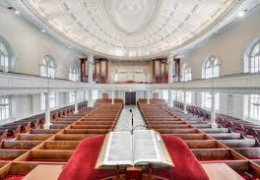 Article by Brett McCracken, senior editor for the Gospel Coalition and the author of Hipster Christianity and Gray Matters. He also writes regularly for Christianity Today and his website, BrettMcCracken.com. He lives with his wife in Southern California where he serves as an elder at Southlands Church. (original source here)
Article by Brett McCracken, senior editor for the Gospel Coalition and the author of Hipster Christianity and Gray Matters. He also writes regularly for Christianity Today and his website, BrettMcCracken.com. He lives with his wife in Southern California where he serves as an elder at Southlands Church. (original source here)
Do Not Cut Yourself Off from the Body of Christ
Ephesians 5 is often looked to as an instructive passage for marriage, and it is. But I think it is also an instructive passage about the church, especially in an age where many evangelicals have a take-it-or-leave-it ecclesiology somewhere between “I love Jesus but not the church” and “I’ll go to church but only as long as it meets my needs.”
When Paul says “Christ is the head of the church, his body,” it is a statement of union, of one-flesh connectedness. A head is necessarily connected to a body. The head directs the body and has authority over the body but also needs a fully functioning body for effective movement in the world. In a profoundly mysterious way, Christ has humbly attached himself to an imperfect body (those who believe in him) and loved this body, filling it with his sanctifying Spirit so that it will be perfected for that future moment of “without spot or wrinkle” glory. In the meantime the church is still imperfect.
Sadly, the still-imperfect nature of the church proves too challenging for some. They prefer to be “spiritual but not religious.” They embrace Jesus but ditch the church, oblivious to the fact that in so doing they are creepily embracing a decapitated head. Or those who do recognize the importance of the biblical idea of church simply redefine “church” on their terms. These are the people who love saying, “You don’t go to church. You are the church.” This is Donald Miller, who says he connects with God more outside of church and says “the church is all around us, not to be confined by a specific tribe.”1 This is Rob Bell, who now believes church is simply doing life in a beach community with one’s “little tribe of friends” (“We’re churching all the time”).2
But how much can we really grow when we define church on our terms, within the framework of our preferences and proclivities and with a “tribe” of people who “connect with God” most by surfing and enjoying craft beer together? As R. C. Sproul says, “It is both foolish and wicked to suppose that we will make much progress in sanctification if we isolate ourselves from the visible church.”3
Or listen to Spurgeon, who is (God bless him) characteristically blunt about the matter:
I believe that every Christian ought to be joined to some visible Church—that is his plain duty according to the Scriptures. God’s people are not dogs, otherwise they might go about one by one. They are sheep and, therefore, they should be in flocks.4 Continue reading





 Article by Dr. Mark Dever (an excerpt from What is a Healthy Church? – original source
Article by Dr. Mark Dever (an excerpt from What is a Healthy Church? – original source  Article by Melton Duncan, a ruling elder at Second Presbyterian Church in Greenville, S.C. (original source
Article by Melton Duncan, a ruling elder at Second Presbyterian Church in Greenville, S.C. (original source